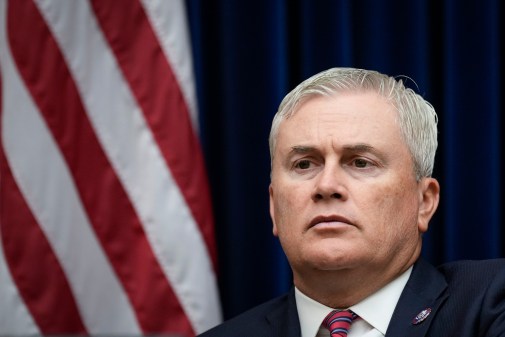Email controversies take spotlight at FOIA hearing
Amid increasing scrutiny of how the government handles its email records, lawmakers heaped criticism on a panel of officials who oversee Freedom of Information Act, or FOIA, requests for their agencies.
“You folks here are part of the problem,” Rep. Jody Hice, R-Ga., spat at witnesses during a House Oversight and Government Reform Committee hearing Wednesday.
Much of the questioning during the tense three-hour hearing involved the increasing number of unfilled FOIA requests across government. Indeed, just the day before, a panel of reporters told the committee about problems they’ve faced filling FOIAs.
But during the hearing, many of the lawmakers referenced the news from earlier this year that former Secretary of State Hillary Clinton used a private email account to conduct official business.
Witness Joyce Barr, the State Department’s chief FOIA officer, had previously testified to a Senate panel that it was “not acceptable” for an agency leader to decide to host emails on a private server, and she echoed similar sentiments Wednesday.
“We don’t like for records to be separated from the agencies. So we were very pleased to have these records back in our collection,” Barr said Wednesday. Clinton turned in 55,000 pages of emails to the agency from her time at State last year.
Meanwhile, committee Democrats defended Clinton and targeted the email practices of former secretaries of State who served in George W. Bush’s administration.
Several asked Barr about a 2007 FOIA request from watchdog group Citizens for Responsibility and Ethics in Washington for copies of Condoleezza Rice’s emails during her turn as secretary. In its response, the State Department told CREW it had no emails that applied to their request, the lawmakers said.
“The State Department did not have any emails that were responsive to the request,” Barr repeated to lawmakers. Though, she said State has some of Rice’s emails in their collection.
At the same time, former Secretary of State Colin Powell has said in the past that he used his personal email while in office and has not submitted any emails to State.
“I hope that we will look at that era just like we’ve been looking at the present era with regard to these emails,” said the committee’s senior Democrat, Rep. Elijah Cummings of Maryland.
Meanwhile, Republicans prodded Mary Howard, the director of the IRS’s privacy, governmental liaison and disclosure office, about the missing emails from a retired IRS employee who some allege was unfairly rigorous in her oversight of tea party groups’ tax-related documents. The IRS has said in the past that the computer on which the emails were stored crashed and her emails were lost.
Lawmakers emphasized the need to streamline the FOIA process across government.
“There undoubtedly have to be changes,” said Committee Chairman Jason Chaffetz, a Republican from Utah.
The witness panel — which included representatives from State, IRS, Justice, Homeland Security and Treasury — defended their agency’s efforts. In her testimony, Melanie Pustay, director of the Department of Justice’s Office of Information Policy, highlighted the FOIA portal the agency is working on with digital services team 18F.
“We’re constantly looking for things to be faster,” Pustay said.




